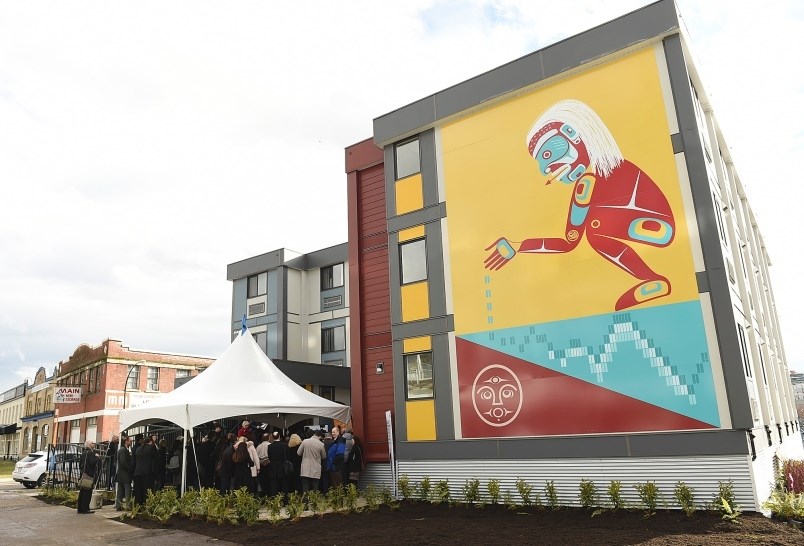Modular housing for the homeless, an earnings exemption for individuals on welfare and more funding to fight the fentanyl crisis are among the social investments the B.C. government committed to make in its budget update, Monday.
Social investments are some of the few new funding announcements included in an updated budget that largely built on the former Liberal government's budget plans already announced in March.
Finance Minister Carole James said the NDP government wants to grow the economy and that, "we want it done in a way that invests in people, in a way that provides support for the people who helped build this economy."
The updated budget includes $291 million over two years to build 2,000 new modular housing units for the homeless. It will spend an additional $170 million to operate them, including 24/7 staffing and support services.
That means spending $145,500 to build each unit and $85,000 in operating costs, per unit. The units are pre built and can be stacked together.
The government will also build 1,700 new affordable rental housing units over four years for low-to-moderate income renters, seniors, adults with disabilities and mental health challenges.
Kishone Roy, CEO of the B.C. Non-Profit Housing Association, said the housing investments are a step in the right direction, especially the funding for staffing and support services.
"Without them, people tend to move in and out of social housing. But with some wrap-around supports, you can really help that person sort their life out," Roy said.
But he said he'd like to see a commitment from the government to a longer-term plan.
"Our number one priority is a 10-year plan to solve homelessness and affordable housing crisis. It's great that Year One is done, but what I'd like to see in the full budget in the spring is that long-term commitment that matches what the federal government is doing," Roy said.
Individuals on income assistance and disability will get a $200 bump in the amount of money they can earn before the government claws backs its assistance.
The government had already announced a $100 boost to disability and income assistance.
Iglika Ivanova, senior economist with the Canadian Centre for Policy Alternatives, said the earnings exemption bump is positive, but it would help more people to see a greater increase in social assistance rates across the board.
“I think it will help some people, but what the majority of people on welfare and on disability assistance need is a bigger increase in basic rates. $100 is good, it’s definitely better than what we’ve seen in the last 10 years, which is nothing, but we’re talking about [a total of] $710 per month for a single person on welfare. In B.C., that doesn’t go very far and is thousands of dollars below the poverty line,” Ivanova said.
Meanwhile, about half of the $603 million added to the health sector budget will go toward the fentanyl crisis. Of the $290 million committed to the crisis, $265 million will go through the Health Ministry for measures like supervised consumption services, take-home naloxone kits and education for doctors, nurses and pharmacists.
Another $25 million is for increasing policing and $7 million to alleviate pressure on the B.C. Coroners' Service.
The budget also revealed the role that the newly formed Ministry of Mental Health and Addictions will play. About $25 million will be used to establish the new ministry, which will provide key strategic leadership, rather than delivering specific services.
Bev Gutray, of the Canadian Mental Health Association’s B.C. Division, said she’s happy with the formation of a new ministry.
“It seems to us the ministry has a clear direction and is going to work with all of the other ministries,” she said.
“We look forward to a focus, although this budget is much more focused on the opioid crisis. We’re really looking to the next budget to see the focus on prevention and early intervention,” Gutray said.
Edith MacHattie, co-chair of the B.C. Health Coalition, said she will be looking forward to a stronger focus on seniors in the February budget.
“Providing adequate home and community care and more fulsome community supports for our seniors is critical in addressing waitlists in hospitals,” MacHattie said.



